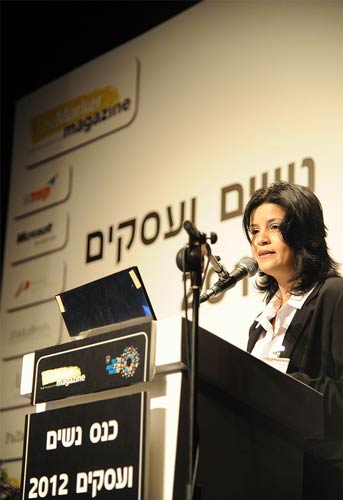By Avigayil Kadesh
Women are at the forefront of Israel’s burgeoning biotech world, yet Amal Ayoub stands out from the other female execs in her field because she is an Arab-Israeli.
Ayoub’s startup, Metallo Therapy, is banking on gold nanoparticles to boost the effects of radiation therapy while reducing damage to neighboring healthy cells.
The business is based on her own graduate and postgraduate research in biomedical engineering at Ben-Gurion University of the Negev. She’d earlier earned a bachelor’s degree at the prestigious Technion-Israel Institute of Technology.
“At Ben-Gurion we developed a new radioisotope for radiation therapy, and methods to introduce heavy metals into cancer cells to enhance radiation therapy,” she explains. “I did this for 10 years, so I have a lot of experience in this field.”
Though she was a hard worker and a star student with a good idea, Ayoub had no entrepreneurial background to help her set up Metallo Therapy.
“I was totally without experience in business, and I had to make very tough decisions regarding the technology to make it more suitable for the market, which I did not know at the beginning,” she says. “Today I am much wiser and have learned from many other entrepreneurs.”
Serving as chief executive officer and chief technology officer, Ayoub hired an Arab-Israeli chemical engineer with a degree from the Technion, and an Arab-Israeli biologist. Together they are perfecting a method to produce gold nanoparticles efficiently on an industrial scale, having already developed a molecule to coat them so that they do not cause toxic interactions when injected into a malignant tumor.

Ayoub speaking at a conference for businesswomen in IsraelThough gold is expensive, the amounts Metallo Therapy uses are so minuscule that the process is no more costly than for any other new drug. And Ayoub is convinced from her previous studies that the nanoparticles help radiation therapy do its job better.
“Gold is a big atom containing a lot of electrons,” she explains. “Under radiation it can absorb the rays better than smaller atoms can, and its electrons can emit secondary radiation efficient in destroying the cancer cells.”
Chief Scientist’s Office backing
She won three years’ worth of funding from the Israeli Chief Scientist’s Office through the NGT Technology Incubator in Nazareth, the only applied sciences company devoted specifically to the Arab-Israeli community's scientific, technological and entrepreneurial potential.
“They were excited about me and about the idea,” Ayoub says. “I didn’t have difficulties convincing NGT that there is great potential in this technology.”
Metallo Therapy also received $300,000 from the pharmaceutical division of Arkin Holdings, a fund established by Israeli healthcare entrepreneur Mori Arkin, to begin advanced animal trials using mice.
“We decided to invest in Metallo Therapy because we believe it has innovative technology for treating cancer, excellent basic science, and management with the necessary skills,” said Arkin Holdings’ Pini Orbach. “We also believe that the Arab Israeli community has much talent in the life sciences, and that investments of this kind will help promote Jewish-Arab cooperation in various fields.”
Additional funds from Arkin may come if results of current lab tests are promising. Meanwhile, a Jewish-Israeli business development consultant is helping Ayoub move the startup forward.
“We are now fine-tuning [in the lab], and at some point ... we will move on to more in-vivo studies.”
A love of science
She says it is not unusual for girls from her ethnic background to be drawn to the sciences early on.
“A lot of young Arab women are interested in engineering and medicine,” the Nazareth native says. “From a very young age I loved science and my teachers encouraged me to study it.”
Now 36 and fluent in Hebrew and English, she relates that her scholastic success past the high school stage did not come easily at first.
“There were difficulties since I studied in an average high school and come from a very average family,” she says. “When I went to university I had to face the fact that I did not know enough Hebrew or English to manage, but I quickly succeeded in overcoming this obstacle. The other issue was money. My parents could not fund my education, so I had to work.”
Today she sees that the landscape has changed. “The government wants Arabs to be in Israeli industry, so I think they will have more opportunities and fewer obstacles.”
Ayoub is married to a high school teacher (“He teaches science, of course,” she says with a laugh) and is the mother of two boys, aged seven and four. She sees herself in some ways as just another female Israeli biotech executive juggling career and motherhood.
At the same time, she realizes that she serves as a role model to Arab-Israeli girls. “I am a pioneer, and can be an example of a successful Arab woman who broke the glass ceiling,” she says.